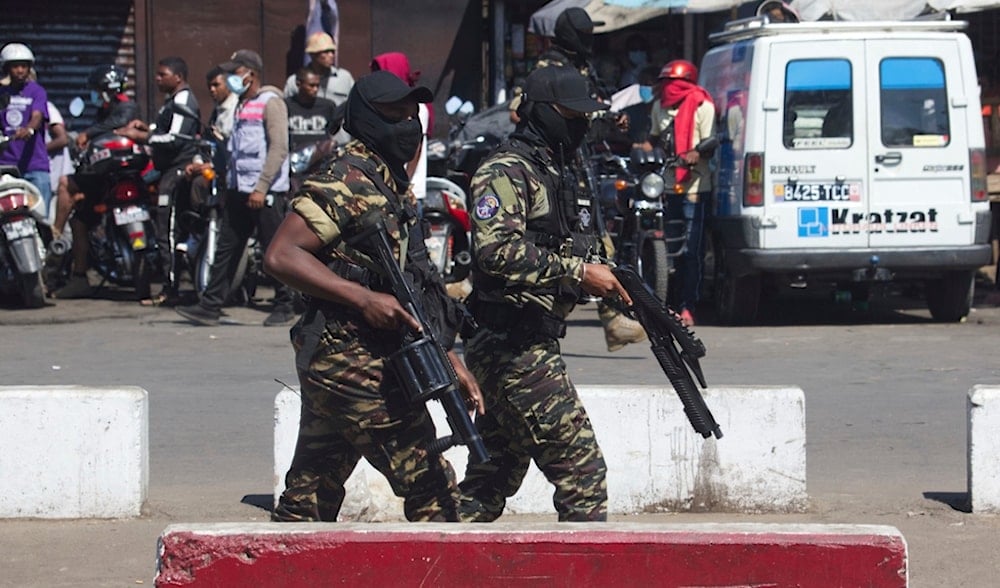Madagascar warns of coup after military unit joins anti-gov protests
An elite military unit in Madagascar has declared control over the armed forces after weeks of youth-led protests demanding President Andry Rajoelina's resignation, signaling a deepening political crisis in the island nation.
-

Police patrol the streets during a protest calling for the president to step down in Antananarivo, Madagascar, Thursday, Oct. 9, 2025 (AP)
Madagascar's President Andry Rajoelina has denounced the “attempt to seize power illegally and by force,” as an elite military unit, Capsat, announced it was taking over command of the country’s armed forces.
The declaration came after weeks of intensifying anti-government demonstrations. On Saturday, members of Capsat joined protesters in the capital, Antananarivo, further escalating a deepening national political crisis.
Capsat, a unit previously instrumental in bringing Rajoelina to power in a 2009 coup, stated that it would not fire on demonstrators and urged the rest of the military to unite in refusing to use force.
BREAKING NEWS:
— African Hub (@AfricanHub_) October 12, 2025
Soldiers in Madagascar have rejected an order to shoot protesters
“They Are Our Friends, Brothers And Sisters” ~ Madagascar Soldiers Publicly Urge Colleagues, Police To ‘Refuse Orders’ To Shoot Protesters As Several Thousands Of Gen Zs March In The Capital,… pic.twitter.com/IhhWutNitP
By Saturday afternoon, its members had departed their base in Soanierana district in the south of the capital and moved toward the symbolic May 13 Square, accompanied by thousands of cheering protesters.
Gen Z Madagascar and the Rise of Youth-Led Protests
The protests began on 25 September, initially sparked by water and electricity shortages. Organized by Gen Z Madagascar, a decentralized group inspired by similar youth-led movements in Indonesia and Nepal, the demonstrations quickly evolved into a broad anti-government campaign.
Protesters demanded the resignation of President Rajoelina, an end to corruption, and a complete overhaul of the political system.
Chants of “Miala Rajoelina!” (Leave Rajoelina!) echoed through the capital as tens of thousands took to the streets. Despite the firing of the government on 29 September, the demands have not subsided.
Government Responds as Protests Escalate
In a statement issued Sunday, Rajoelina emphasized he was “in the country … managing national affairs.” His newly appointed prime minister, Ruphin Fortunat Zafisambo, had appeared on state television Saturday evening, pledging that the government was “fully ready to listen and engage in dialogue with all factions – youth, unions or the military.”
However, the president condemned the Capsat move as unconstitutional, warning both the national population and the international community of the seriousness of the situation.
While Capsat claims control over the military, it remains unclear whether the rest of the armed forces have recognized its authority.
Madagascar: soldiers at CAPSAT barracks mutiny and side with the youth uprising. "Our children are suffering, we are not here to kill and beat them. We are experiencing the same suffering. We must support them. Let us not allow ourselves to be manipulated by money or position." pic.twitter.com/Hkrj75D8Pk
— Jorge Martin ☭ (@marxistJorge) October 11, 2025
Concerns Over Military Involvement and Democratic Order
Capsat’s intervention raised mixed reactions among protesters and observers. While some hailed it as a step toward political change, others voiced concerns about military overreach. One activist described the soldiers and accompanying opposition politicians as “dangerous.”
The situation escalated further on Saturday when a Capsat general reported that one of their soldiers had been killed by the gendarmerie, which operates under the defense ministry.
A journalist was also reported to have been shot. The UN has reported at least 22 people killed since protests began, though Rajoelina disputed the number, claiming 12 “looters and vandals” had died.
Madagascar, with a population of around 32 million, remains one of the world's poorest countries. According to the World Bank, its GDP per capita stood at just $545 in 2024. The country, rich in gemstones and vanilla, was ranked 140 out of 180 countries in Transparency International’s 2024 corruption perceptions index.
As the crisis continues to unfold, uncertainty looms over Madagascar’s democratic process and the role of the military in the country’s future.
Read more: Morocco protests escalate into violent clashes with police

 3 Min Read
3 Min Read










